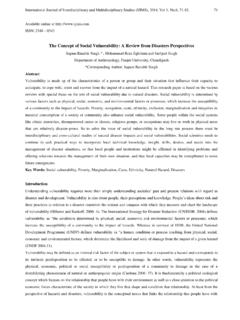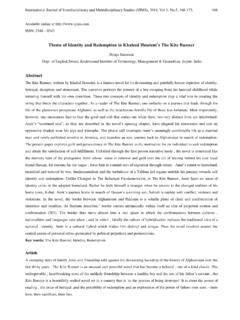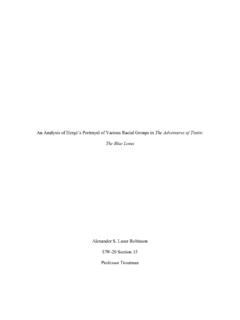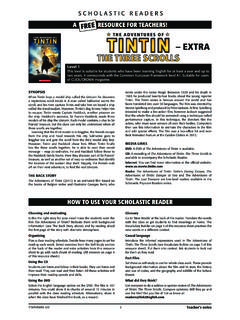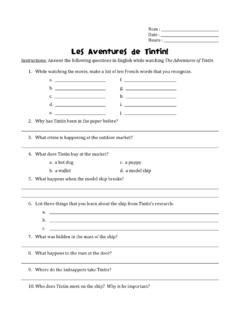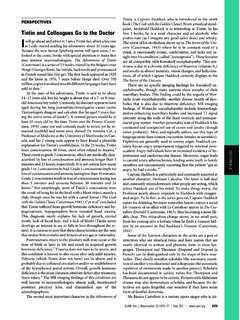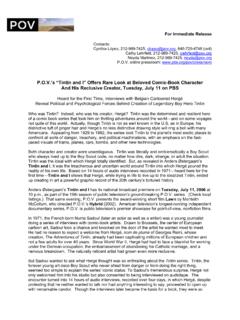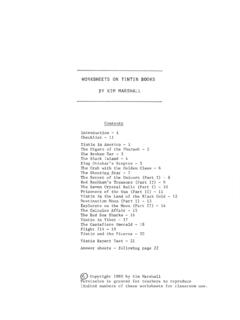Transcription of Tintin Needs His Other: A Study of Othering and Colonial ...
1 International Journal of Interdisciplinary and Multidisciplinary Studies (IJIMS), 2015, Vol 2, ,30-36. 30 Available online at ISSN: 2348 0343 Tintin Needs His Other: A Study of Othering and Colonial Politics in The adventures of Tintin Debottama Roy Faculty of English, Higher Secondary Section ,Kamala Chatterjee School for Girls, Kolkata Abstract I aim to show in this paper how the identity of Tintin as the white savior is predicated upon the Othering of the colonized peoples and the formation of derogatory racial stereotypes.
2 I have also included concepts like mimicry, resistance and hybridity. Keywords: colonialism, orientalism, Othering , stereotype, racism, imperialism, white saviour Article Edward Said s contention in Orientalism, that the representations of the Orient in European literary works, travelogues and other writings were a help in the construction of a sense of difference between Europe and it s Others, finds special resonance in The adventures of Tintin . Said argues that this disparity between the Orient and the Occident is not only crucial to the construction of European culture, but is also necessary for maintaining and establishing power over the Other. The Tintin series has managed to retain its popularity for many decades now.
3 Loved mostly for Tintin s feats of adventure, Captain Haddock s extremely lovable antics and the Thompson twins hilarious misadventures, the Tintin books continue to attract readers of all ages. However, it is possible to discern in these books, elements that make them more than just innocent tales of adventure. In fact, on closer scrutiny the books reveal features which helped to justify and aid Europe s exploitative Colonial mission in the East. The Foucaultian insight that knowledge is not innocent but intricately connected with the operations of power is particularly relevant to The adventures of Tintin . Tintin is a white European investigative journalist.
4 Professionally, therefore, he is involved in the handling of facts . His work requires him to observe and to report. Observation and reporting is inseparably bound with the game of power. In a Colonial society, it is the Colonial master who always possesses the power of surveillance and language. Tintin s observations and representations of the Other could go a long way in creating an image of the Orient and giving it currency. Tintin is like the Orientalist scholars. He visits foreign lands to make the truth known to the world-the truth that would help Europe to create and establish its superiority in relation to the East and also create at the same time a manageable Other which could be conveniently controlled and subjugated.
5 In fact, the very basis of Tintin s identity and the interest of these books lie in Othering . His personality is built up on a series of subtle contrasts with his others. Edward Said s fundamental argument is that Orientalism, or the Study of the Orient, the other, was eventually a political vision of reality whose structure encouraged a binary opposition between Europe and the East. In his phenomenal work Orientalism, Said shows that this opposition is crucial to European self-conception: if colonized people are irrational, Europeans are rational; if the former are barbaric, sensual and lazy, Europe is civilization itself, with its sexual appetites under control and its dominant ethic that of hard work; if the Orient is static, Europe can be seen as developing and marching ahead; the Orient has to be feminine so that Europe can be masculine.
6 1 Orientalism is a discursive practice which operated in the service of the West s hegemony over the East. Orientalism serves to produce the East discursively as the West s inferior Other. This is done principally by essentializing the identities of the East and the West, which is achieved by International Journal of Interdisciplinary and Multidisciplinary Studies (IJIMS), 2015, Vol 2, ,30-36. 31 establishing racial stereotypes. Stereotyping is the simplification of images and ideas to a simple and convenient form. It is actually a strategy of processing information. Stereotypes very subtly perpetuate a false sense of disparity between self and other.
7 The gathering of information about non-European lands and peoples and classifying them in various ways determined strategies for their control. The different stereotypes of the mild Hindoo , the warlike Zulu , the barbarous Turk , the New World cannibal , or the black rapist were all generated through particular Colonial situations and were tailored to different Colonial policies. In Africa and India, by attributing particular characteristics to specific tribes and groups, Colonial authorities not only entrenched divisions between the native population, but also used particular races to fill specific occupations such as agricultural workers, soldiers, miners, or domestic servants.
8 2 Ironically, the huge success of the Tintin books has a lot to do with the stereotypes in which they abound. The image of the white saviour who braves the seven seas and battles frightening adversities in order to save helpless non-Europeans is a notion which nourished European imagination and protected it against the actual reality of Colonial violence. The aim of this paper is to show how in the various Tintin books, stereotypes consolidate Tintin s identity, the plots depend upon Othering and how various strategies of language, selection and arrangement vindicate the imperialist venture. I would like to begin with The Cigars of the Pharaoh for it exploits certain very basic yet effective stereotypes to manipulate and construct the reader s responses towards the Orient as well as the Occident.
9 The stereotype of the noble ruler in the colonies, benevolent yet ineffectual, was widely propagated by the colonizers to justify their intervention in native affairs. Indian history bears testimony to this for the British rulers used the situation to their advantage when the local Indian kings sometimes failed to handle their affairs. Lord Wellesley s subsidiary alliance required a signatory prince to avoid any diplomatic relation or alliance with any other Indian power without the approval of the company. An English resident, residing at the court of the prince was to advise him on all matters of administration. In return the British would provide the native prince with an English army led by an English general for his protection.
10 In this Tintin book, the maharaja of Gaipajama is drawn upon these lines. The maharaja is kind, honest, dutiful yet not competent enough to crush the opium trade that runs illegally in his kingdom. In fact the king s father and brother had also not seen the light of success when they too, had tried to subdue this evil trade. It is the white saviour in the form of Tintin who manages to find entry into the secret meeting of the culprits and expose them. The maharaja s son is kidnapped but it is not the maharaja who tries to rescue him. It is Tintin who brings the prince back and earns the eternal gratitude of the maharaja. Being a foreigner, it would be extremely unlikely for Tintin to know the detailed geography of the maharaja s kingdom; it would be natural for the maharaja to send a rescue party and get back his son.
